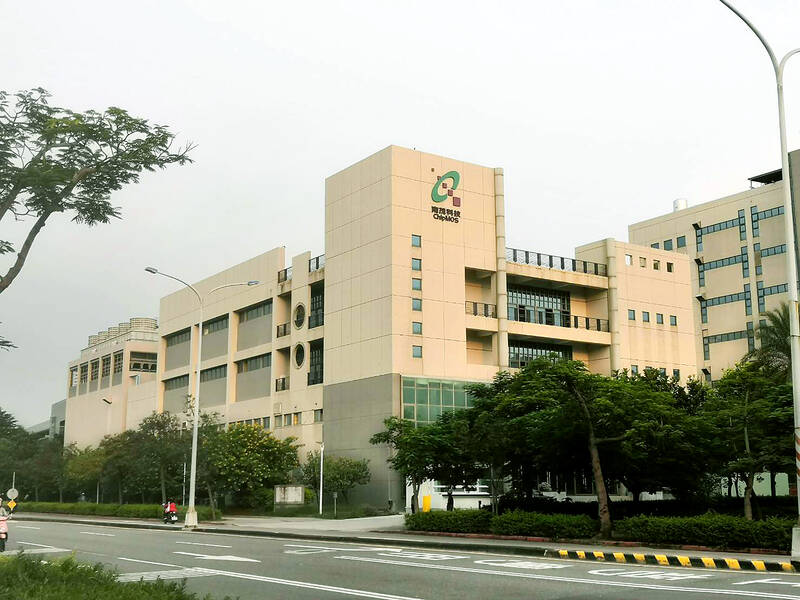ChipMOS Technologies Inc (南茂科技), a tester and packager of driver ICs and memory chips, yesterday said that revenue would rise gradually from this quarter, aided by significant improvement in demand for its packaging services used in flat panel drive ICs.
ChipMOS said growth gained momentum last month and would extend into this quarter. The pickup in display drive ICs (DDIC) reflected on a 28 percent sequential expansion in revenue last month to NT$1.84 billion (US$60 million).
“We received a lot of rush orders from customers in the DDIC area lately,” ChipMOS chairman S.J. Cheng (鄭世杰) told a virtual investors’ conference yesterday.

Photo: Yang Chin-cheng, Taipei Times
“Based on the industry’s situation and feedback from customers, the company’s overall operation will start rebounding each quarter from the second quarter,” he said.
Customer wafer inventories stored at ChipMOS’s wafer bank are dropping rapidly and stock must be rebuilt, Cheng said.
ChipMOS said that a rise in demand for flat panels used in vehicles, touch controller-display driver integration ICs and ultra-high-definition organic light-emitting diode displays is driving ChipMOS’s DDIC packaging services during the current quarter.
DDIC packaging services comprised about 52.9 percent of the company’s revenue last quarter, rising 4.2 percentage points from 48.7 percent in the previous quarter, the company’s data showed.
Memory chip testing and packaging services, which accounted for 15 percent of revenue last quarter, is expected to remain flat this quarter, Cheng said.
The recovery is forecast to be slow, likely starting next quarter, he said.
ChipMOS yesterday reported a 30.7 percent quarterly growth in net profit to NT$202.4 million last quarter, compared with NT$154.9 million in the fourth quarter of last year, attributable to an improvement in foreign exchange rates.
Net profit annually plummeted 83.5 percent from NT$1.22 billion, the company said.
Earnings per share rose to NT$0.28 from NT$0.21 a quarter earlier, but fell from NT$1.68 a year earlier.
A lessening of foreign exchange losses helped boost non-operating profit to NT$43.5 million last quarter, reversing a non-operating loss of NT$130 million in the previous quarter, the company said.
Gross margin fell to 12.4 percent last quarter, from 14.5 percent in the fourth quarter last year and 25 percent in the same period of last year.
Separately, memorychip maker Winbond Electronics Corp (華邦電) yesterday joined its local competitors in reporting the first quarterly loss in about 11 quarters, as the industry is weathering the inventory correction cycle.
Winbond lost NT$1.01 billion during the quarter ending March 31, compared with net profit of NT$4.56 billion during the same period last year, the company’s filing with the Taiwan Stock Exchange showed.
That translated to losses per share of NT$0.25 quarter, compared with net profit per share of NT$1.15 in the first quarter last year.
Gross margin worsened to 27.74 percent last quarter from 48.59 percent a year earlier.
That was the first quarterly loss in about 11 quarters. Winbond said the first quarter would be the worst period for the company in terms of average selling prices and factory utilization.

Semiconductor business between Taiwan and the US is a “win-win” model for both sides given the high level of complementarity, the government said yesterday responding to tariff threats from US President Donald Trump. Home to the world’s largest contract chipmaker, Taiwan Semiconductor Manufacturing Co (TSMC, 台積電), Taiwan is a key link in the global technology supply chain for companies such as Apple Inc and Nvidia Corp. Trump said on Monday he plans to impose tariffs on imported chips, pharmaceuticals and steel in an effort to get the producers to make them in the US. “Taiwan and the US semiconductor and other technology industries

A start-up in Mexico is trying to help get a handle on one coastal city’s plastic waste problem by converting it into gasoline, diesel and other fuels. With less than 10 percent of the world’s plastics being recycled, Petgas’ idea is that rather than letting discarded plastic become waste, it can become productive again as fuel. Petgas developed a machine in the port city of Boca del Rio that uses pyrolysis, a thermodynamic process that heats plastics in the absence of oxygen, breaking it down to produce gasoline, diesel, kerosene, paraffin and coke. Petgas chief technology officer Carlos Parraguirre Diaz said that in

CHIP WAR: Tariffs on Taiwanese chips would prompt companies to move their factories, but not necessarily to the US, unleashing a ‘global cross-sector tariff war’ US President Donald Trump would “shoot himself in the foot” if he follows through on his recent pledge to impose higher tariffs on Taiwanese and other foreign semiconductors entering the US, analysts said. Trump’s plans to raise tariffs on chips manufactured in Taiwan to as high as 100 percent would backfire, macroeconomist Henry Wu (吳嘉隆) said. He would “shoot himself in the foot,” Wu said on Saturday, as such economic measures would lead Taiwanese chip suppliers to pass on additional costs to their US clients and consumers, and ultimately cause another wave of inflation. Trump has claimed that Taiwan took up to

SUBSIDIES: The nominee for commerce secretary indicated the Trump administration wants to put its stamp on the plan, but not unravel it entirely US President Donald Trump’s pick to lead the agency in charge of a US$52 billion semiconductor subsidy program declined to give it unqualified support, raising questions about the disbursement of funds to companies like Intel Corp and Taiwan Semiconductor Manufacturing Co (台積電). “I can’t say that I can honor something I haven’t read,” Howard Lutnick, Trump’s nominee for commerce secretary, said of the binding CHIPS and Science Act awards in a confirmation hearing on Wednesday. “To the extent monies have been disbursed, I would commit to rigorously enforcing documents that have been signed by those companies to make sure we get